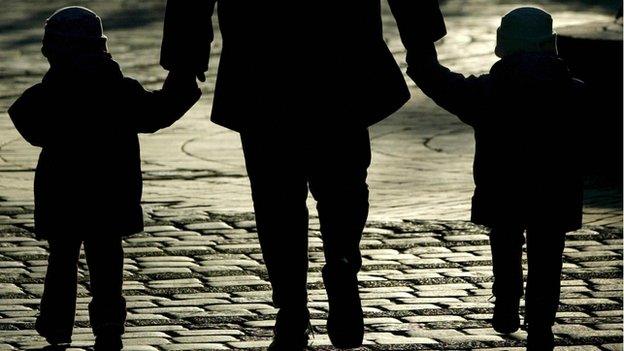Duchess of Cambridge records child mental health message
- Published
The Duchess of Cambridge: ''Both William and I sincerely believe that early action can prevent problems in childhood from turning into larger ones later in life''
The Duchess of Cambridge has recorded a video message in support of the first ever Children's Mental Health Week.
She says that stigma around mental health means that many children do not get the help they need.
The duchess recorded the message, external for the Place2Be charity, which is organising the mental health week.
Kensington Palace said she was a "committed champion of issues related to children's mental health and emotional wellbeing".
Place2Be, of which the duchess is a patron, provides emotional help and support in schools and is organising the first ever Children's Mental Health Week.
In the message, Kate says that both she and the Duke of Cambridge have seen how many children struggle to cope with issues such as bullying, bereavement and family breakdown, which can lead to depression, anxiety, addiction and self-harm.
"Through Place2Be I have seen the benefits of offering children support for their mental health in the safety of the school environment," says Kate, who has been royal patron of the charity since 2013.
"Both William and I sincerely believe that early action can prevent problems in childhood from turning into larger ones later in life."
'Early intervention'
The video was recorded at Bethlem and Maudsley Hospital School in Beckenham, south London, to launch the week-long campaign by the charity.
BBC News School Reporters from Bishop Challoner Catholic Collegiate School look at the issue of self-harm
A Kensington Palace spokesman said: "Her Royal Highness has seen that issues such as addiction, poverty, abuse, neglect, loss and illness of family members, can have a long-lasting and traumatic impact if left unsupported.
"The Duchess of Cambridge is especially concerned with early intervention mental health support for young people, to tackle these issues at the earliest possible stage, so that children have the brightest possible futures, as they deserve."
Catherine Roche, chief executive of Place2Be, said: "We're thrilled to have the support of our royal patron, HRH The Duchess of Cambridge, for this important new campaign.
"By raising awareness of the benefits of getting support early for mental health issues, we hope to change attitudes and help reduce the risk of more complex and serious problems when those children reach adulthood."
- Published12 February 2015
